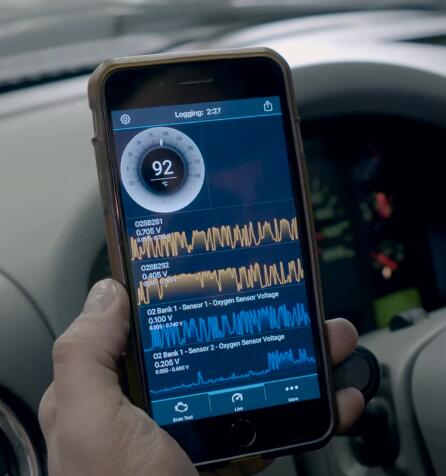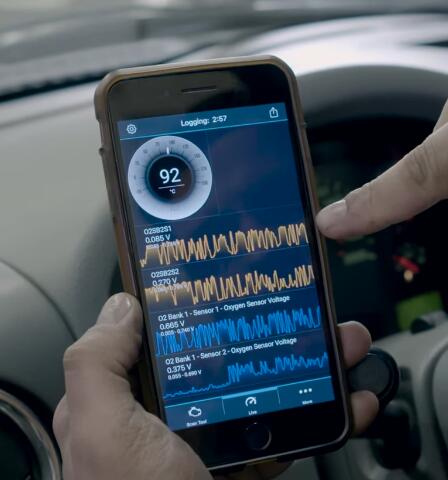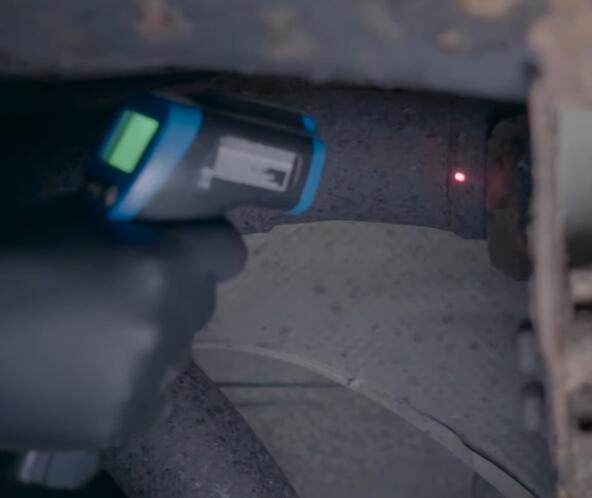This instruction will show you guide on how to diagnose your catalytic converter issues on Ford F150. This method is also adapt to other vehicles. For more cases about Ford, please click to Ford Trouble Repair.
A catalytic converter reduces harmful emissions coming from your engine. Some of the common symptoms associated with catalytic converters include:
Check engine light
Misfire
Smell of Sulfur or rotten eggs from the exhaust
Excessive heat under the vehicle
Ratting sounds underneath the vehicle
Poor fuel efficiency
Poor acceleration
Difficult to start
Fail vehicle emissions test
Also there are a number of codes associated but far the most common is a P0420, other DTC(Diagnostic Trouble Codes) is P0430,P0421,P0431,P0422.
To start catalytic converter diagnosis, we need to use the live data from the Blue Driver. To do that we need to get the truck up to operating temperature. While you’re waiting for your vehicle to get up to operating temperature, you can go ahead and set up your blue driver app with the live data sources that you’ll need. You’ll need the engine coolant temperature sensor and the oxygen sensors related to your vehicle. Some vehicles only have one bank of sensors, while other vehicles have two banks of sensors just pull in the oxygen sensors that are available to you.
As you can see, our oxygen sensors are now starting report data. We have two banks of sensors in this Ford vehicle, so we’ve color coded them to make them easier to see. We’ll focus on this top set , our sensors are reporting in voltage.

However your sensors may report in miliamps or in lambda. The units don’t really matter but the behavior of the data is what does matter.

The top sensor is pre-cat, it’s before the catalytic converter, and this helps the engine maintain a good air fuel ratio and it fluctuates based on that ratio.
Sensor 2 measures the efficiency of the catalytic converter that should stay relatively stable throughout the running of the engine.
As you can see, the sensor 1 is doing quite well, it’s moving up and down regulating the air fuel mixture. However sensor 2 is jumping all over the place, sometimes not reporting data or not staying stable like it’s supposed to. We suspect that this means that the catalytic converter on bank 2 is probably gone or that the sensor is bad. What we do next is we’ll go to the catalytic converter and do another piece of diagnosis to see if that’s our problem.
Another way to assess the health of your catalytic converter is to have a look at your inlet and outlet temperatures. If your catalytic is good and healthy, then the outlet is going to be about 10 hotter than the inlet . We are going to measuring this using infrared thermometer. If you’re lucky and you have a newer vehicle, you might be able to get this data through the live data in a scan tool,but we’re going to show you the manual hands-on way depending on your vehicle. Your catalytic might be underneath about midway along the exhaust or it might be further up in the engine bay, some front wheel drive four cylinder vehicles it might be just behind the radiator. Additionally if there’s a heat shield over your catalytic, you might need to kind of squeeze around it. You want to make sure that you’re measuring as close as possible to the catalytic, otherwise your temperatures might not be exactly accurate.

We’re getting our outlet temperature as close as we can without measuring the heat shield itself. And we’re not quite getting 10 percent so our catalytic may be bad.
To summarize if your outlet temperature is less than 10 higher than your inlet temperature or it’s lower than our inlet temperature that’s bad. If you’re hitting the catalytic converter, you can hear something rattling around inside that’s really bad, and if you’ve got both then that’s extremely bad. It’s time to replace your catalytic converter.